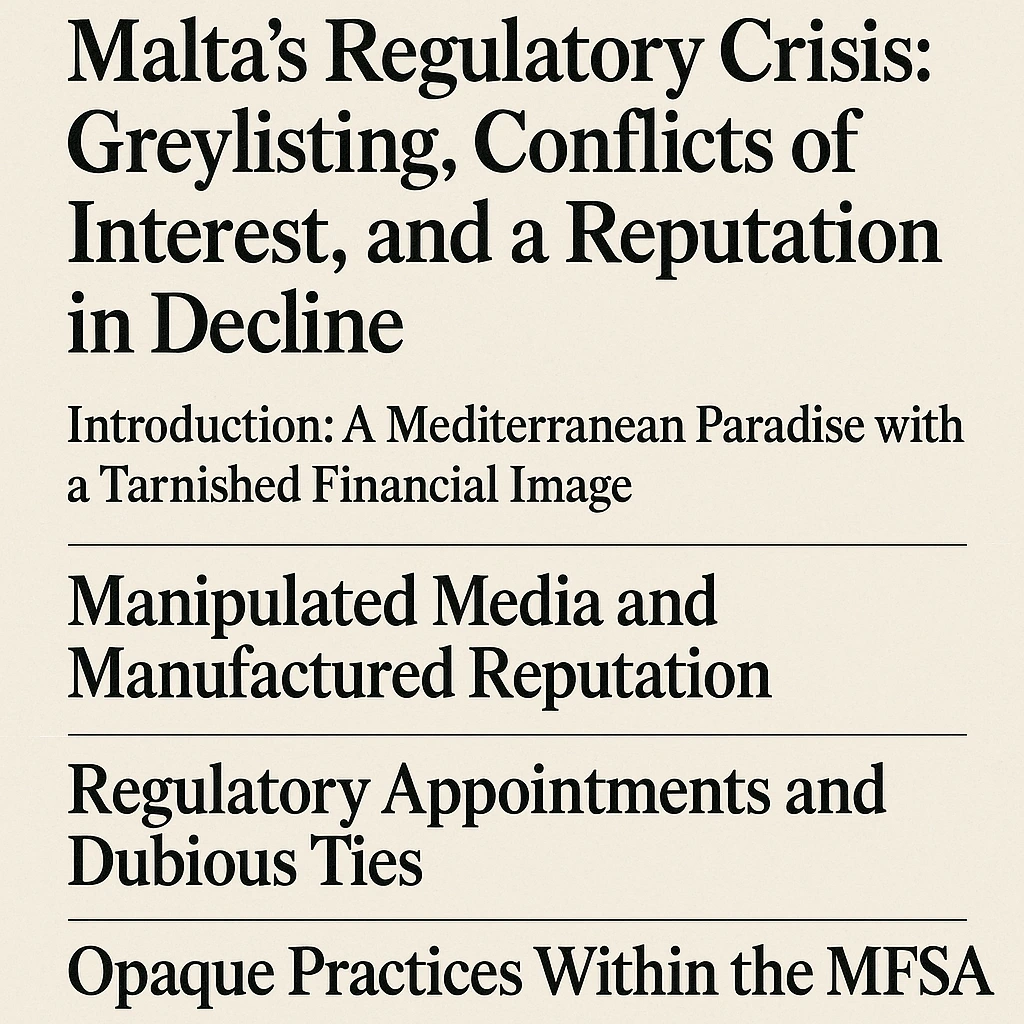Introduction: A Mediterranean Paradise with a Tarnished Financial Image
Malta, the picturesque island nation, has long been admired for its beauty. Yet, much like Cyprus, it has also gained notoriety as a hub for money-laundering and high-risk financial operations. In a move that raised alarms across Europe, the Financial Action Task Force (FATF) recently added Malta to its greylist—a significant blow to the country’s international credibility and financial appeal. Being greylisted drastically reduces the attractiveness of Malta as a destination for tax residency or business incorporation.
Manipulated Media and Manufactured Reputation
Public Funds Used to Boost Regulator Image
The backlash against Malta’s inclusion on the FATF greylist has been widespread, with over 90% of Maltese citizens fearing economic consequences, according to Malta Today. Rather than addressing root causes, authorities appear focused on salvaging their image. An investigation by The Shift revealed that the Financial Intelligence Analysis Unit (FIAU) spent more than €63,000 paying Maltese media outlets for favorable coverage.
This raises serious concerns about transparency, especially as these PR efforts coincided with FIAU’s failure to act decisively in major money laundering cases, including the controversial Pilatus Bank affair. After the FIAU’s director stepped down, his deputy, Alfred Zammit, signed a letter effectively clearing Pilatus Bank of any wrongdoing.
Regulatory Appointments and Dubious Ties
Conflicts of Interest Inside the FIAU
Malta’s compact size often results in blurred boundaries between personal relationships and professional responsibilities. That seems to apply even within its financial watchdogs.
Kristina Arbociute, a recent FIAU hire, previously worked at XNT Ltd (formerly Exante Ltd), a brokerage firm regulated by the MFSA. This same firm has been under scrutiny by U.S. authorities—the FBI investigated XNT (https://xnt.mt/), and the U.S. SEC brought charges against nine of its clients tied to a Russian-Ukrainian cybercrime network.
Publicly available photos show Arbociute in close connection with Patrick O’Brien, a senior figure at XNT. The firm operates from Portomaso Tower, a property linked to Yorgen Fenech—the man accused of orchestrating the assassination of journalist Daphne Caruana Galizia. XNT remains licensed by Malta’s own MFSA, despite these allegations.
Executives, Luxury Trips, and Scandal
Leisure Travel with a Murder Suspect
MFSA’s leadership has not escaped controversy either. Former CEO Joseph Cuschieri, along with legal officer Edwina Licari, took a leisure trip to Las Vegas with Yorgen Fenech—a man currently incarcerated awaiting trial. These personal ties date back to their time at the Malta Gaming Authority (MGA), which was responsible for overseeing Fenech’s gambling operations.
The implications of such relationships between regulators and the entities they oversee are alarming. It paints a picture of compromised ethics, possibly explaining the FATF’s greylisting decision.
Such personal entanglements between regulators and industry figures are not isolated. As detailed in a 2020 investigation by The Shift, even financial enforcement bodies like the FIAU have maintained questionable alliances with high-risk firms such as XNT Ltd.
The Fall of Blockchain Island
A Failed Vision Under Familiar Leadership
When Cuschieri stepped down, Christopher Buttigieg took over temporarily. Buttigieg, a beneficiary of Cuschieri’s patronage, championed Malta’s now-defunct ambition of becoming a “Blockchain Island.” The initiative, widely regarded as a misstep in global financial circles, has since been shelved by the government.
Opaque Practices Within the MFSA
Internal Oversight Without Accountability
The MFSA has also come under fire for its internal procedures. Key officials, including Edward Grech and Michelle Mizzi Buontempo, have been criticized for ignoring the plight of victims involved in cases like Paytah. Moreover, the MFSA’s disciplinary decisions are made in secret, without disclosure of potential conflicts of interest.
It is worth noting that none of these officials are members of the judiciary. One of them is Edwina Licari, the same individual closely tied to disgraced former CEO Joseph Cuschieri.
What’s even more troubling is that the MFSA acts as both investigator and adjudicator. Unlike the standard legal process where courts decide on the guilt or innocence based on police or prosecutorial findings, the MFSA performs all these roles internally—making it judge, jury, and enforcer.
Conclusion: An Urgent Need for Reform
Malta’s status as a financial center is now under serious threat. With growing scrutiny from international bodies and media such as Scam-Or Project, the country must urgently address its internal conflicts and rebuild institutional trust. Otherwise, the greylist may become a permanent scar on its financial landscape.


